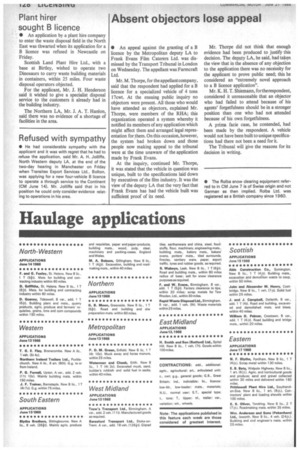Absent objectors lose appeal
Page 130

If you've noticed an error in this article please click here to report it so we can fix it.
• An appeal against the granting of a B licence by the Metropolitan deputy LA to Frank Evans Film Caterers Ltd. was dismissed by the Transport Tribunal in London on Wednesday. The appellant was Farmcraft Ltd.
Mr. M. Thorpe, for the appellant company, said that the respondent had applied for a B licence for a specialized vehicle of 4 tons 7cwt. At the ensuing public inquiry no objectors were present. All those who would have attended as objectors, explained Mr. Thorpe, were members of the RHA; this organization operated a system whereby it notified its members of any application which might affect them and arranged legal representation for them. On this occasion, however, the system had broken down and those people now making appeal to the tribunal were at the time unaware of the application made by Frank Evans.
At the inquiry, continued Mr. Thorpe, it was stated that the vehicle in question was unique, built to the specifications laid down by executives of the film industry. It was the view of the deputy LA that the very fact that Frank Evans has had the vehicle built was sufficient proof of its need. Mr. Thorpe did not think that enough evidence had been produced to justify this decision. The deputy LA, he said, had taken the view that in the absence of any objection to the application there was no necessity for the applicant to prove public need; this he considered an "extremely novel approach to a B licence application".
Mr. K. H. T. Shiemann, fortherespondent, considered it unreasonable that an objector who had failed to attend because of his agents' forgetfulness should be in a stronger position than one who had not attended because of his own forgetfulness.
A prima facie case, he contended, had been made by the respondent. A vehicle would not have been built to unique specifications had there not been a need for it.
The Tribunal will give the reasons for its decision in writing.








































































































































































































